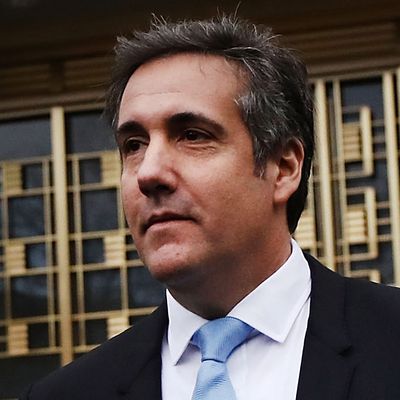
One month after Donald Trump took office, one of the world’s largest drug companies signed a $1.2 million contract with the new president’s personal lawyer. Technically, the Swiss firm Novartis reached this agreement with Essential Consultants LLC; but that company’s sole consultant was Michael Cohen — and his “consulting” proved to be anything but essential.
In truth, “Essential Consultants” was a slush fund, in which major corporations deposited bribes to Trump’s attorney, and from which he withdrew funds to buy the silence of an adult-film star with whom the president allegedly fornicated (we know all of this now thanks, in part, to that porn star’s attorney).
If that all sounds possibly illegal — and definitely crooked — that’s because it is. But the shadiness of Cohen’s enterprise appears to be mitigated (however slightly) by its incompetence — while businesses tried to buy influence over our government through Cohen, they don’t seem to have been very successful.
AT&T gave Trump’s lawyer $200,000 for “insights” into the administration, just as said administration was reviewing its desired merger with Time Warner. Then, in a break from the Republican tradition of law antitrust enforcement, the White House moved to block the takeover.
And Novartis may have gotten an even rawer deal: Shortly after Trump’s inauguration, Cohen called Novartis’s then-CEO Joe Jimenez, and promised the pharmaceutical company access to Trump and his inner circle — particularly, to those administration officials involved in crafting health-care policy and tax law — if Jimenez agreed to lease Cohen’s “consulting” services. Or so Novartis employees tell Stat News.
Alas, as Novartis explained in its official statement on the matter Wednesday, the drug company got much less than it had bargained for: After a single meeting with Trump’s attorney, “Novartis determined that Michael Cohen and Essential Consultants would be unable to provide the services that Novartis had anticipated related to US healthcare policy matters and the decision was taken not to engage further.” And yet, since “the contract unfortunately could only be terminated for cause, payments continued to be made until the contract expired by its own terms in February 2018.”
Stat News offers a more detailed account of the company’s rationale:
“At first, it all sounded impressive, but toward the end of the meeting, everyone realized this was a probably a slippery slope to engage him. So they decided not to really engage Cohen for any activities after that,” the employee continued. Rather than attempt to cancel the contract, the company allowed it to lapse early in 2018 and not run the risk of ticking off the president. “It might have caused anger,” this person said.
So: The president’s lawyer reportedly phoned up a drug company and offered to sell it access to the White House (and, implicitly, influence over American health-care policy), then gave them it virtually nothing of use — but nonetheless led its employees to believe that that if they didn’t continue paying him $100,000 a month, the U.S. president might grow angry and use his political power to punish them.
And, thanks to our nation’s robust “free speech” protections, it’s not yet clear that any part of this scheme violated the laws of our proud democracy.






























